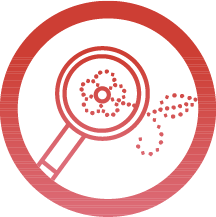What First Nations, Inuit and Métis-led cancer research opportunities are there?
Why is this indicator important to First Nations, Inuit and Métis?
First Nations, Inuit and Métis-led cancer research ensures First Nations, Inuit and Métis researchers have a level playing field, including opportunities to serve as principal investigators, hold research funding, and build capacity among First Nations, Inuit and Métis communities, researchers and collaborators to participate in research.
Additionally, most major research institutions and universities are in southern Canada which can pose a significant barrier to First Nations, Inuit and Métis-led cancer research opportunities in northern Canada. In 2006, the Qaujigiartiit Health Research Institute was established to address the health research needs of communities in Nunavut. Though not specifically aimed at addressing cancer research, the Institute seeks to ensure that “health research is conducted locally, by northerners, and with communities in a safe, supportive, culturally-sensitive and ethical environment.”1 These principles are keystones for self-determined research.
First Nations, Inuit and Métis Peoples-specific, self-determined research is key to understanding access, experience and outcomes in cancer care and identifying community-led efforts and potential solutions for better outcomes. Often this research results in qualitative data which is not as highly valued in western institutions as quantitative, data-driven research, yet can be more representative of patient, family and community experiences with cancer. Further, there is a gap in First Nations, Inuit and Métis-led medicinal and genomics research in Canada.
Research can identify not only the gaps in care, but best and promising practices in First Nations, Inuit and Métis approaches that can be shared more widely.
Most importantly, culturally competent research and community context can shape strategies that are responsive to First Nations, Inuit and Métis Peoples’ unique needs and priorities.
View Indigenous determinants of health
How does this affect care and outcomes?
Research findings can provide valuable evidence to inform community-led efforts to improve First Nations, Inuit and Métis access, experiences, and outcomes in cancer prevention and care.
Specifically, First Nations, Inuit and Métis-led research can support the development of community-responsive, culturally appropriate policies and programs, capacity building, and system improvements which can lead to improved care and outcomes.
Towards health equity
First Nations, Inuit and Métis-led research can highlight ways to improve the cancer experience, access to services, and cancer care outcomes for First Nations, Inuit and Métis patients and families. More research of this nature is needed to make systemic improvements that address historical injustices perpetrated by the health system and researchers as well as systemic racism faced by First Nations, Inuit and Métis patients and families.
First Nations, Inuit and Métis-led research can ensure that everyone can benefit from advancements in the prevention, diagnosis, and treatment of cancer.
What this would mean for people in Canada
All people in Canada have an equitable opportunity to live longer, healthier lives throughout the cancer journey.
View indicator development process
View ways of measuring the indicators
- Qaujigiartiit Health Research Centre (qhrc.ca)

